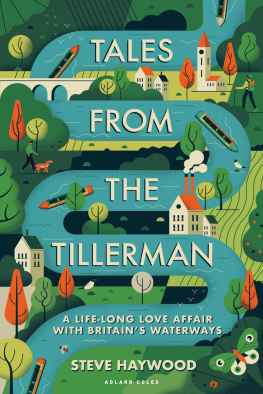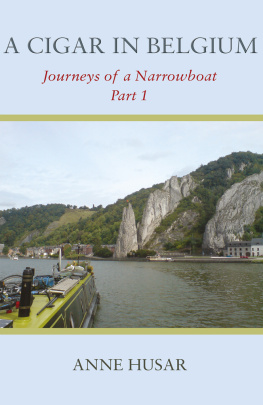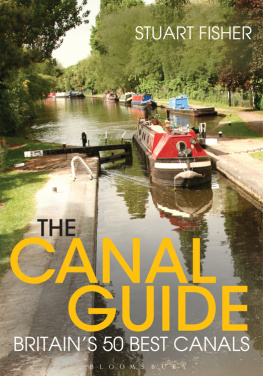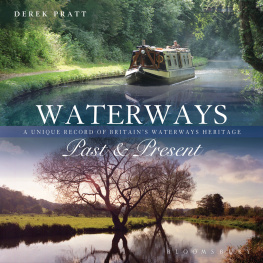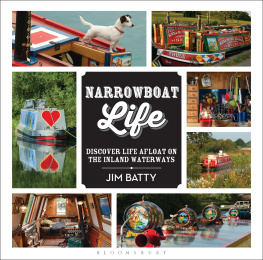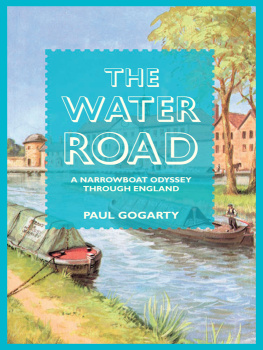
Thanks to my old friend Miles Hedley whose care and attention correcting the first draft of my books propagates the fallacy that I can actually write, let alone spell.
And to my grandfather Arthur Hoden without whom none of this would have been possible

Contents
At my age, you never know when its all going to end. But I certainly know when it all began: in Banbury, the very afternoon we set off on what turned out to be a four-year trip travelling about on our 57ft (17.4m) narrowboat Justice , a trip wed promised ourselves wed do someday when work allowed. My wife Em went off to do some last-minute errands in the shopping centre and I was left the job of filling up our water tank. I jammed the end of the hose into the water inlet on the boat and turned the tap on fully while I pottered around doing a few other jobs. It was OK for a while but then suddenly the hose broke loose under the pressure. It went flying into the air like a rocket before hitting the ground, snaking about, spraying water everywhere.
I dodged to get out of the way but I must have pulled something. An agonising jolt of pain shot up my leg and I collapsed on the towpath in excruciating agony. It wasnt a good way to start an expedition like this, but hey, what could we do? Wed only just given up our home. Wed rented it out to tenants. Wed got nowhere else to go.
Life can be a bitch sometimes.
Actually, it can be a bitch quite a lot of the time.
I just had to grit my teeth and get on with it.
It wasnt until Harry, the lock keeper, opened the gates and the flow of the river hit us, exploding against our bows with the force of a mortar shell, that I understood why people are so terrified of this stretch of water.
The boat immediately lifted and pitched to one side, stopping dead for a moment in the surge. Then the flow of the river swept the boat towards one bank and almost immediately afterwards spun it awkwardly towards the other until it stopped again, trembling against the current. Now it was trapped, going nowhere. I wound up the speed wheel, but to no effect. I wound it up more with added urgency, increasing the engine revs until the exhaust pipe in the roof was discharging a thick plume of smoke as black as the chimney of a Victorian factory. Yet still the boat made no progress against the tide, which was ripping down the River Douglas at a terrifying rate. It was a high tide, the very highest on which theyll let a boat out, we learned later. Cascading down with it were clusters of sodden wood: branches, trunks of trees and discarded timber, known in these parts as crocodiles. Any one of these could jam our propeller, stopping it dead in its tracks and leaving us without any means of steering.
The most important thing now was to stay calm and in the centre of the river. If we touched the muddy bank, however briefly, it would throw us off course and wed lose control completely. We might spin around until we dammed the narrow tributary and were swamped by the oncoming water. Or we might be flushed backwards, past the lock mouth wed just exited, where we could encounter shallows. Either way, it would end in tears.
Id only felt as frightened as this once before on a boat. It was when I was with a friend on his Dutch sailing barge and we were coming out of the lock at Vlissingen in the Netherlands to cross the wide estuary of the Western Scheldt, the main shipping route from the North Sea to Antwerp. The weather had started getting blowy the previous night and by the morning it had developed into a raging gale. We should never have gone out in those conditions. My boating expertise had been acquired exclusively on the meandering byways of Englands placid canals. My friend hadnt even got that much experience. Hed only recently bought the barge, his first boat, and hed conscripted me as crew to help him take it to London, where he was planning to live on it.
Once clear of the lock and in open water the wind intensified and the waves became more powerful. The first we hit picked the boat up 56ft (1.51.8m) and dropped it in a crashing welter of spray that I was convinced would overwhelm us. I remember thinking, ridiculously, that at least we were close to the shore and that it wouldnt take a lifeboat long to get to us. I was on the tiller. It was one of those tillers you get on traditional Dutch barges: a huge block of wood operated through pulleys by ropes that you have to wind around your hands to secure. Its a cumbersome arrangement and I was unfamiliar with it. Every movement of the boat stretched the ropes taut until they gouged into my flesh, leaving raw weals across my fingers. Each wave we hit wrenched my shoulders as if to pull my arms from their sockets. I wasnt confident I could handle the boat with this set-up. It was virtually flat-bottomed and I couldnt see how I could keep it upright in these conditions. Soon it began rolling as well as pitching, its gunnels slicing through the water on the port side, flooding the deck, and then lurching over to starboard to do the same, its mast like some huge metronome oscillating across the dark and threatening sky
But that was then and this was now.
Then, the storm had blown my friend and me to calmer waters, and the rest of our trip was uneventful fodder for one of those tales old salts tell, peppered with what-ifs and might-have-beens. Now, however, on a narrowboat on the River Douglas fighting against the tide to get to the River Ribble, Em and I couldnt depend on anything except our own experience to get us out of trouble. We were alone, reliant on nothing and no one but ourselves. I handed the tiller to her and disappeared below deck into the engine room. There, against the furious and deafening roar of our vintage three-cylinder Lister, I managed to reconfigure the controls of the boat in order to tease more power out of the throttle. After a heart-stopping interval that seemed an hour long, a jubilant shout from Em outside seemed to be a sign Id been successful and with some relief I hurried back on deck.
The boat was moving forwards more confidently now, not fast, but at least faster than before. It wasnt hard to see why. The engine was burning much cleaner and the black smoke from the exhaust had all but disappeared. It seemed that by revving up the engine Id effectively de-coked its cylinders. The crud this had displaced was scattered across the top of the boat: flakes of soft soot and oily fragments of carbon, like the residue from a greasy volcanic beach. A great deal of the discharge seemed to have found its way on to Ems face, where it looked as if shed closed her eyes and started experimenting with mascara. My own face wasnt much better. I was like a Celtic warrior decorated by someone with double vision.
Once we logged that the immediate danger was past we broke down in a fit of the giggles. Before long, we were laughing uncontrollably in a way that was perhaps a tad too hysterical to be normal. With the benefit of hindsight, I can see what made us act like that. It was relief pure, unadulterated relief. A release from the tension wed both been feeling since leaving Tarleton Lock. The fact is, thered been an ugly moment or two when wed both been convinced that the boat was going to sink and take us down with it.
The only way to get to the Lancaster Canal without going around the coast is to take this route along the River Douglas and on to the River Ribble, but the hazardous journey this involves is the main reason narrowboaters are so reluctant to explore what is the very northernmost outpost of Englands canal system, a waterway that stretches virtually up to the Lake District. Crossing the Ribble Link, as its known, is not like cruising the placid waterways of the Midlands, the bits of the system you see in innumerable celebrity TV programmes; and its certainly not the sort of waterway you can navigate after a ten-minute seminar from a boatyard at the start of a family holiday. As you battle down the Douglas punching the tide, the force of it mercifully abates as the river widens, until at length it joins the estuary of the Ribble, which at this stage is so close to the Irish Sea, it is the Irish Sea. The waters here broaden spectacularly into one huge and shimmering expanse of water so wide that even in clear weather you can hardly make out the far bank. The winds become more forceful, too, the waves increase in size and the sky seems to expand suddenly as if its just exploded above the world. At this point you have to round a beacon, there to warn you that youre getting close to dangerous shallows which could ground you. So imbued in the consciousness of ocean-going sailors and inland skippers alike is this beacon the Astland Lamp that it has become notorious in a way that scarcely seems warranted given that its only a frail-looking wooden stanchion sunk into the bed of the river with a ladder propped up to it and a few brackets to buttress it against the weather.

